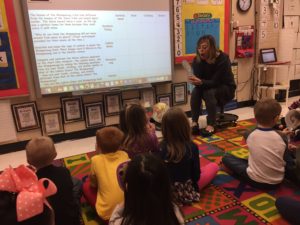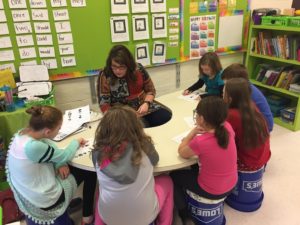W hen a first-grader in Trousdale County was recently asked to sit down on his behind, he replied with the correct anatomical term: “You mean on my gluteus maximus?”
hen a first-grader in Trousdale County was recently asked to sit down on his behind, he replied with the correct anatomical term: “You mean on my gluteus maximus?”
The adults nearby were amazed. A first grader? Using vocabulary like this?
In Trousdale, Putnam, and Sullivan counties, parents, bus drivers, and community members keep asking: “What are you teaching these kids?” All three districts are part of the LIFT Network, a group of 12 innovative school systems that vary from the state’s smallest to its largest. Convened by SCORE, these districts are focused on a common problem of practice: improving K-2 literacy.
A 2016 TN Department of Education report shows evidence of a performance slide in Tennessee elementary schools: almost half of students that score “proficient” or “advanced” on third-grade ELA exams slip to lower achievement levels by fifth grade. Experts believe this is because of an over-emphasis on teaching reading skills (e.g., phonics, fluency, spelling, print concepts) in early grades and an under-emphasis on teaching knowledge-based competencies (e.g., reading comprehension and meaning-making) that underpin later reading success.
 To tackle this challenge, the LIFT network is focused on improving read-alouds in K-2 classrooms. Read-alouds are dedicated times for teachers to read rich, complex texts out loud to students, allowing children in early grades to grapple with and discuss ideas and texts they are capable of understanding but cannot yet read independently. Indeed, research shows that students’ independent reading ability only catches up to their listening comprehension at about age 13.
To tackle this challenge, the LIFT network is focused on improving read-alouds in K-2 classrooms. Read-alouds are dedicated times for teachers to read rich, complex texts out loud to students, allowing children in early grades to grapple with and discuss ideas and texts they are capable of understanding but cannot yet read independently. Indeed, research shows that students’ independent reading ability only catches up to their listening comprehension at about age 13.
Trousdale, Putnam, and Sullivan counties are particularly focused on reading aloud texts that not only teach students new words but also share important facts about real-world topics, like colonial history and science. The Tennessee ELA standards require students to “establish a base of knowledge across a wide range of subject matter” and “gain both general knowledge and discipline-specific expertise”. A strong read-aloud unit focuses on high-quality texts around a common topic that builds students’ knowledge and understanding of the world, such as the human body, colonial towns and townspeople, or seasons and weather.
The results of this emphasis speak for themselves:
- Students are using new vocabulary in their personal lives. First-graders in Trousdale County are talking with their parents about the food pyramid, using vocabulary like “dairy”, “grains”, “servings”, and “non-healthy fats.”
- Struggling readers are not only engaged in classroom discussions but leading them: in Putnam County, kindergarten students who receive special education services are presenting evidence to their teachers after discussing texts on plants and farms.
- Students in early grades are developing knowledge about the world and the skills to utilize that knowledge: second-graders in Sullivan County are having formal classroom debates about whether they’d rather live in ancient Athens or ancient Sparta.
While these districts have seen early successes, these efforts are a work in progress. Knowledge-rich content is only one piece of a great read-aloud; teachers also need to ensure that texts are appropriately complex, that questions and tasks reflect the demands of the Tennessee standards, and that students are responsible for doing the critical thinking over the course of a lesson. Throughout the year, SCORE will continue to highlight how LIFT network districts are grappling with these challenges.
This SCORE Sheet post was co-authored by Chris Daniels and Courtney Seiler
Chris Daniels is a Project Director with TNTP, where he focuses on early literacy academic strategy with a consortium of districts in Tennessee and cross-LEA collaboration on staffing policies in Washington, DC. Prior to working with TNTP, Chris served at the U.S. Department of Education, at the Bill and Melinda Gates Foundation, and as a seventh-grade math teacher in Philadelphia. He holds a BA in religion from Columbia University, an MS in Education from the University of Pennsylvania, and an MBA from Harvard Business School.

